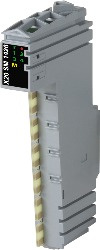
X20SM1426 - Motor control
- I/O module 1 full bridge for controlling stepper motors
- 1 stepper motor, 24 VDC, 1 A (1.2 A peak)
- Resolution of current values at 1%
- Maximum, rated and holding current configured independent of each other
- 38.5 kHz PWM frequency
- Integrated motor detection
- 256 micro-steps
- Stall detection
- Complete integration in Automation Studio and CNC applications
- 4 inputs, 24 VDC, can be configured as ABR
- Ramp function model based on the CANopen communication profile DS402
- NetTime timestamp: Position change, trigger time
The stepper motor module is used to control stepper motors with a rated voltage of 24 VDC at a motor current up to 1 A (1.2 A peak). Additionally, this module has four digital inputs that can be used as limit switches or as encoder inputs.
Due to the individual adjustment of the coil currents, the motor is only operated with the current it actually needs. This simplifies the selection of the available motors and prevents unnecessary heating. Because this affects energy consumption and thermal load, the effects are positive on the service life of the complete system. Complete flexibility is achieved through the use of independently adjustable holding, maximum and nominal current values. The current for microsteps is automatically adjusted to the configured current values.
The automatic motor identification system is an enormous help during standstills. The stepper motor modules can identify the connected motors using their coil characteristics and generate feedback in the form of an analog value. This makes it possible to detect not only wiring errors, but also incorrect motor types being used mistakenly. "Stall detection" is integrated to analyze the motor load. Detection of the stall is defined via a configurable threshold. This allows an overload or motor standstill to be detected precisely in many different types of applications.
